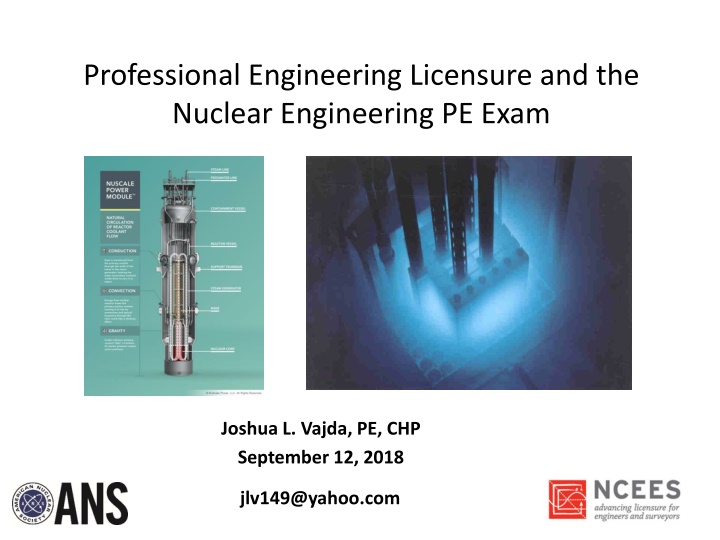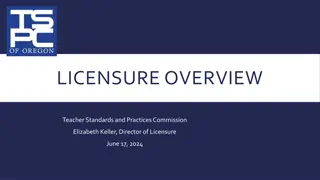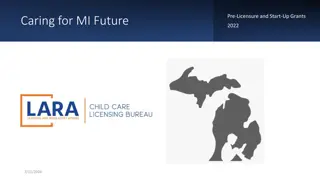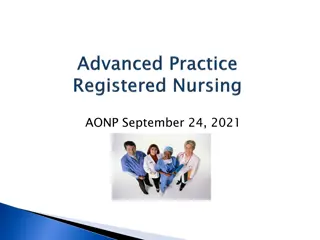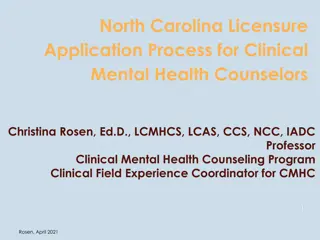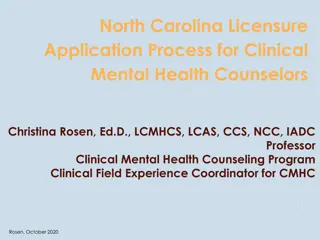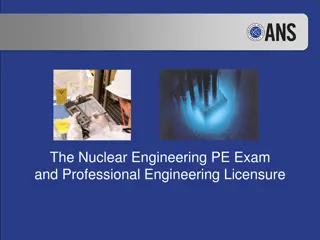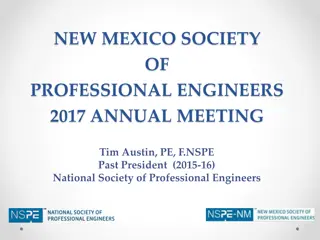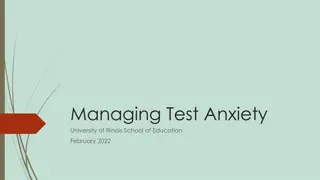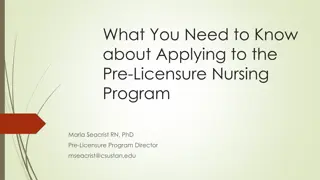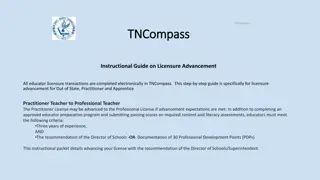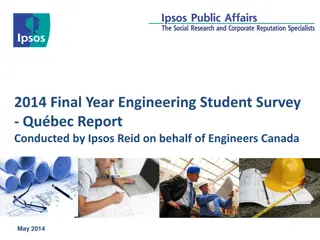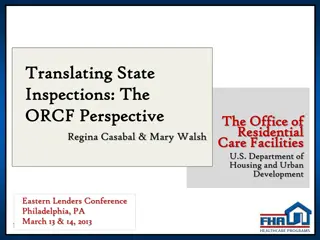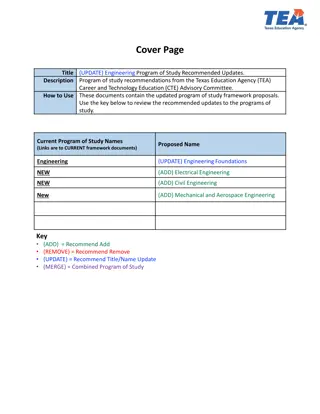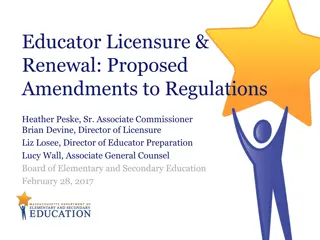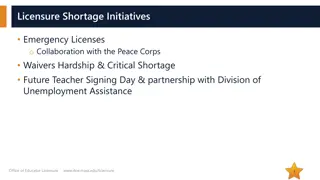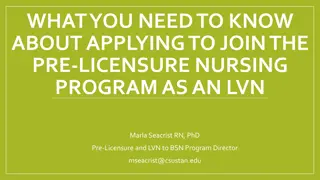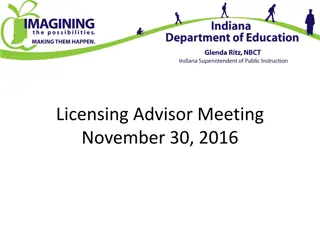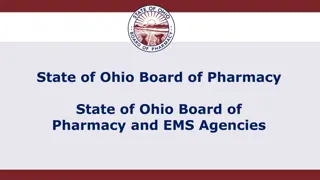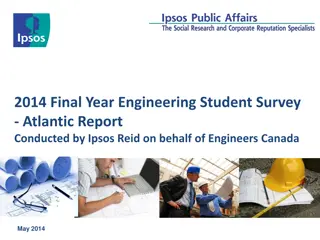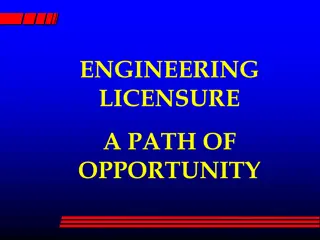Professional Engineering Licensure and its Importance
Professional licensure in engineering is vital to ensure public safety by restricting practice to qualified individuals. Obtaining a Professional Engineer (PE) license is essential for offering services, consulting, signing/sealing design documents, and more. The National Council of Examiners for Engineering and Surveying (NCEES) plays a key role in regulating licensure, setting standards, and maintaining professional ethics. State licensing boards oversee engineering licensure laws, and candidates should check state-specific requirements.
Download Presentation

Please find below an Image/Link to download the presentation.
The content on the website is provided AS IS for your information and personal use only. It may not be sold, licensed, or shared on other websites without obtaining consent from the author.If you encounter any issues during the download, it is possible that the publisher has removed the file from their server.
You are allowed to download the files provided on this website for personal or commercial use, subject to the condition that they are used lawfully. All files are the property of their respective owners.
The content on the website is provided AS IS for your information and personal use only. It may not be sold, licensed, or shared on other websites without obtaining consent from the author.
E N D
Presentation Transcript
Professional Engineering Licensure and the Nuclear Engineering PE Exam Joshua L. Vajda, PE, CHP September 12, 2018 jlv149@yahoo.com
What is Professional Licensure? Professional licensure protects the public by enforcing standards that restrict practice to qualified individuals who have met specific qualifications in education, work experience, and exams. In the United States, licensure for the engineering and surveying professions is regulated by the states. Candidates interested in pursuing licensure are encouraged to check the requirements in the state or territory where they plan to practice, as the requirements vary. ncees.org/engineering
See full size image Why is it Important? A PE License is required to Offer engineering services to the public Perform consulting services for pay Sign/seal engineering designs, plans and documents Bid for government contracts Use the title Professional Engineer See full size image A PE License may be required to Act as a qualified expert witness Teach engineering design courses Be considered for promotion or salary increases Use Engineer or Engineering in a company name or job title See full size image
Who is Involved in the Process? https://ncees.org/ National non-profit organization based in Seneca, South Carolina (near Clemson University) Develops, administers, and scores the examinations used for engineering and surveying licensure in the United States Offers records program for licensed engineers and surveyors
NCEES The vision of the National Council of Examiners for Engineering and Surveying (NCEES) is to provide leadership in professional licensure of engineers and surveyors through excellence in uniform laws, licensing standards, and professional ethics in order to safeguard the health, safety, and welfare of the public and to shape the future of professional licensure.
State Licensing Boards Individual state boards are responsible for engineering licensure NCEES makes recommendations. States make the laws encompassing engineering. How do you find your applicable board s contact info/website? ncees.org/engineering Interactive map to find board info/requirements
How is Professional Licensure Obtained? There are three high-level requirements: See full size image Education Experience Examination
Education (from NCEES Model Law) An individual seeking licensure as a professional engineer shall possess one or more of the following education qualifications: a) A bachelor s degree in engineering from an EAC/ABET-accredited program A master s degree in engineering from an institution that offers EAC/ABET- accredited programs A master s degree in engineering from an EAC/M-ABET-accredited program An earned doctoral degree in engineering acceptable to the board b) c) d) EAC = Engineering Accreditation Commission ABET = Accreditation Board for Engineering and Technology
Experience (from NCEES Model Law) An individual seeking licensure as a professional engineer shall present evidence of a specific record of progressive engineering experience. This experience should be of a grade and character that indicate to the board that the applicant may be competent to practice engineering. a) bachelor s degree in engineering : 4 years of experience after the bachelor s degree is conferred b) master s degree in engineering : 3 years of experience c) doctoral degree in engineering acceptable to the board and who has passed the FE exam: 2 years of experience d) doctoral degree in engineering acceptable to the board and who has elected not to take the FE exam: 4 years of experience
Examination (from NCEES Model Law) An individual seeking licensure as a professional engineer shall take and pass the NCEES Fundamentals of Engineering (FE) examination and the NCEES Principles and Practice of Engineering (PE) examination as described below. a) The FE examination may be taken by a college senior or graduate of an engineering program of 4 years or more accredited by EAC/ABET, of a program that meets the requirements of the NCEES Education Standard, or of an engineering master s program accredited by EAC/ABET. b) The PE examination may be taken by an engineer intern*. *candidate who has passes the FE exam and meets the experience requirements described in the Model Law.
Fundamentals of Engineering (FE) Exam The Fundamentals of Engineering (FE) exam is generally your first step in the process to becoming a professional licensed engineer (PE) FE exam is a computer-based exam administered year-round in testing windows at NCEES-approved Pearson VUE test centers The FE exam is a 110-question test, 6 hours long You can register for an FE exam by logging in to your MyNCEES account A $175 exam fee is payable directly to NCEES. Some licensing boards may require you to file a separate application and pay an application fee as part of the approval process to qualify you for a seat for an NCEES exam. Your licensing board may have additional requirements FE exam uses both the International System of Units (SI) and the US Customary System (USCS). http://ncees.org/engineering/fe/ https://account.ncees.org/login
FE Exam Knowledge Areas Mathematics and Advanced Engineering Mathematics (12-18) Statics (8-12) Probability and Statistics (6-9) Dynamics (7-11) Chemistry (7-11) Strength of Materials (8-12) Instrumentation and Data Acquisition (4- 6) Materials Science (6-9) Ethics and Professional Practice (3-5) Fluid Mechanics and Dynamics of Liquids (8-12) Safety, Health, and Environment (4-6) Fluid Mechanics and Dynamics of Gases (4-6) Engineering Economics (7-11) Electricity, Power, and Magnetism (7-11) Heat, Mass, and Energy Transfer (9-14) http://ncees.org/engineering/fe/
Principles and Practice of Engineering (PE) Exam PE exam tests for a minimum level of competency in a particular engineering discipline. It is designed for engineers who have gained a minimum of four years post-college work experience in their chosen engineering discipline The PE Nuclear exam is computer-based and administered one day per year (October 19, 2018) at NCEES-approved Pearson VUE test centers. Closed book with an electronic reference, 85 questions, 9.5 hours (includes a tutorial and an optional scheduled break) Uses both the International System of units (SI) and the U.S. Customary System (USCS). A $375 exam fee is payable directly to NCEES. Some licensing boards may require you to file a separate application and pay an application fee. Your licensing board may have additional requirements. https://ncees.org/engineering/pe/nuclear/
Nuclear PE Examination Specification Nuclear Power Systems (25-39) Interaction of Radiation with Matter (17-25) Design and Analysis (14-21) Components and Systems (9-14) Regulations, Codes, and Standards (2-4) Analysis (13-19) Protection (4-6) Nuclear Fuel Cycle (11-17) Nuclear Criticality/Kinetics/Neutronics (17-26) Fuel Design and Analysis (9-13) Handling, Shipping, and Storage (2-4) Criticality (4-6) Kinetics (4-6) Neutronics (9-14)
ANS Professional Engineering Examination Committee (PEEC) Standing committee since 1974 Meets semi-annually at ANS national meetings Chair and Vice Chair ~30 volunteer members with staggered 3-year terms Prepares exam questions Organizes Nuclear PE examination preparation workshop Prepares PE Examination Study Guide Prepares exam reference
Key Takeaways Know your jurisdiction s requirements! NCEES/state licensing boards are there to help you ncees.org/engineering Obtain meaningful, progressive engineering experience (review definition of engineering experience) Take advantage of prep courses / materials Take exams as soon as you are eligible https://ncees.org/engineering/pe/nuclear/ https://ncees.org/supplemental/launch-login/
